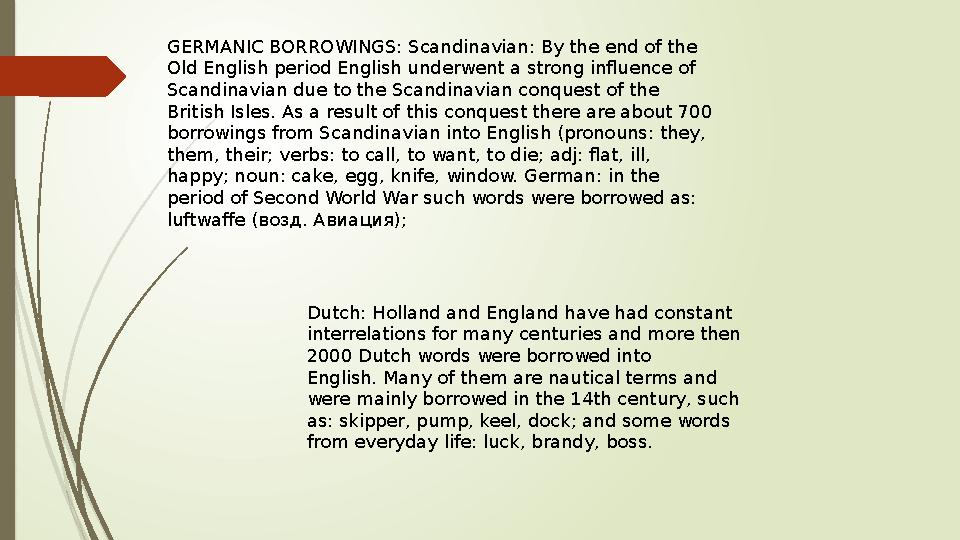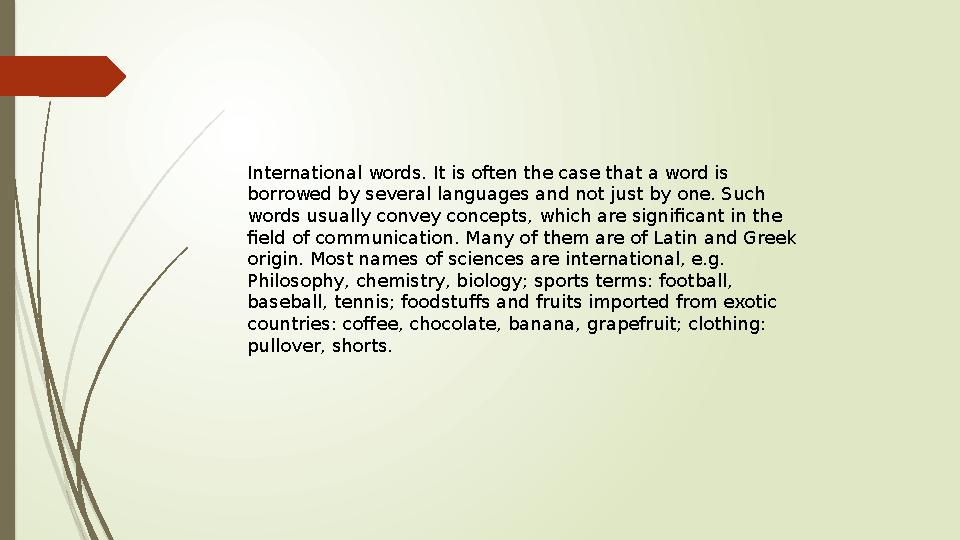The etimology structure of the vocabulary
The etimology structure of the vocabulary


#1 слайд
The etymological
structure of the English
vocabulary
Gogoladze Alina
1 слайд
The etymological structure of the English vocabulary Gogoladze Alina

#2 слайд
The etymological structure of the English
vocabulary
Etimology – branch of lexicology, which deals with
the different possesses of assimilation or
adaptation of the English words The English
vocabulary is very rich.
From the point of view of etymology, English
vocabulary can be divided into 2 parts: 70% of
borrowings in English language, 30% of native
words. Borrowings usually take place under 2
circumstances: 1) when people have a direct
contact with another people; 2) when there is a
cultural need to borrow a word from another
languages.
2 слайд
The etymological structure of the English vocabulary Etimology – branch of lexicology, which deals with the different possesses of assimilation or adaptation of the English words The English vocabulary is very rich. From the point of view of etymology, English vocabulary can be divided into 2 parts: 70% of borrowings in English language, 30% of native words. Borrowings usually take place under 2 circumstances: 1) when people have a direct contact with another people; 2) when there is a cultural need to borrow a word from another languages.

#3 слайд
GERMANIC BORROWINGS: Scandinavian: By the end of the
Old English period English underwent a strong influence of
Scandinavian due to the Scandinavian conquest of the
British Isles. As a result of this conquest there are about 700
borrowings from Scandinavian into English (pronouns: they,
them, their; verbs: to call, to want, to die; adj: flat, ill,
happy; noun: cake, egg, knife, window. German: in the
period of Second World War such words were borrowed as:
luftwaffe (возд. Авиация);
Dutch: Holland and England have had constant
interrelations for many centuries and more then
2000 Dutch words were borrowed into
English. Many of them are nautical terms and
were mainly borrowed in the 14th century, such
as: skipper, pump, keel, dock; and some words
from everyday life: luck, brandy, boss.
3 слайд
GERMANIC BORROWINGS: Scandinavian: By the end of the Old English period English underwent a strong influence of Scandinavian due to the Scandinavian conquest of the British Isles. As a result of this conquest there are about 700 borrowings from Scandinavian into English (pronouns: they, them, their; verbs: to call, to want, to die; adj: flat, ill, happy; noun: cake, egg, knife, window. German: in the period of Second World War such words were borrowed as: luftwaffe (возд. Авиация); Dutch: Holland and England have had constant interrelations for many centuries and more then 2000 Dutch words were borrowed into English. Many of them are nautical terms and were mainly borrowed in the 14th century, such as: skipper, pump, keel, dock; and some words from everyday life: luck, brandy, boss.

#4 слайд
International words. It is often the case that a word is
borrowed by several languages and not just by one. Such
words usually convey concepts, which are significant in the
field of communication. Many of them are of Latin and Greek
origin. Most names of sciences are international, e.g.
Philosophy, chemistry, biology; sports terms: football,
baseball, tennis; foodstuffs and fruits imported from exotic
countries: coffee, chocolate, banana, grapefruit; clothing:
pullover, shorts.
4 слайд
International words. It is often the case that a word is borrowed by several languages and not just by one. Such words usually convey concepts, which are significant in the field of communication. Many of them are of Latin and Greek origin. Most names of sciences are international, e.g. Philosophy, chemistry, biology; sports terms: football, baseball, tennis; foodstuffs and fruits imported from exotic countries: coffee, chocolate, banana, grapefruit; clothing: pullover, shorts.

шағым қалдыра аласыз
















